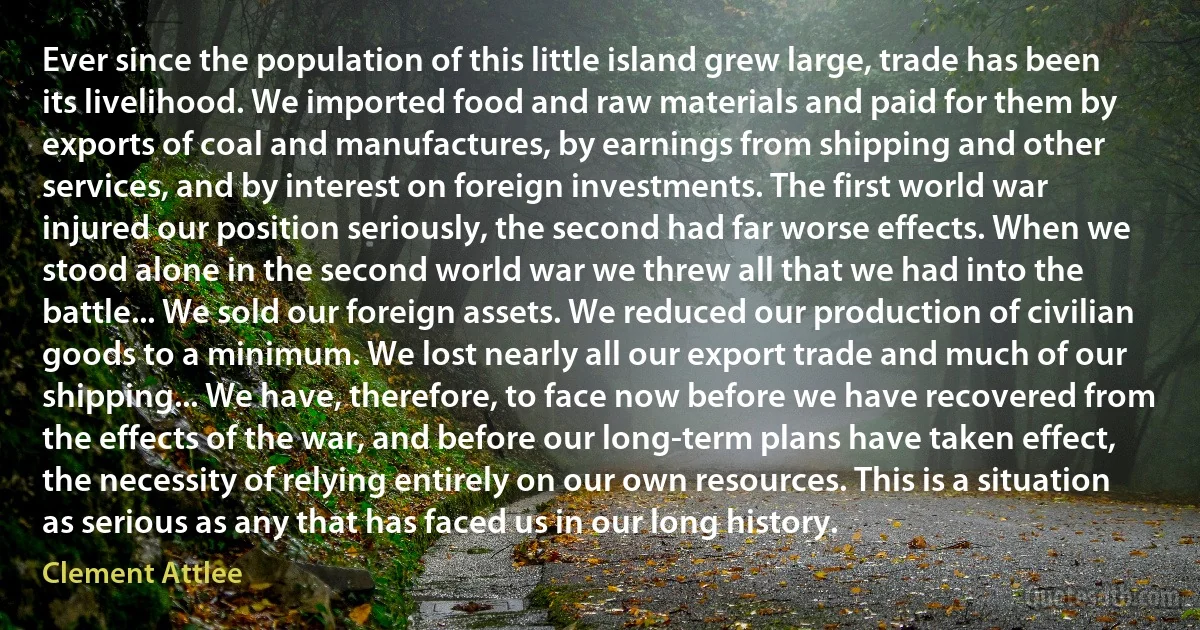
Ever since the population of this little island grew large, trade has been its livelihood. We imported food and raw materials and paid for them by exports of coal and manufactures, by earnings from shipping and other services, and by interest on foreign investments. The first world war injured our position seriously, the second had far worse effects. When we stood alone in the second world war we threw all that we had into the battle... We sold our foreign assets. We reduced our production of civilian goods to a minimum. We lost nearly all our export trade and much of our shipping... We have, therefore, to face now before we have recovered from the effects of the war, and before our long-term plans have taken effect, the necessity of relying entirely on our own resources. This is a situation as serious as any that has faced us in our long history.
Clement AttleeRelated topics
assets battle civilian export face far food foreign goods history interest large lost necessity now pay position production second sold shipping situation stand take throw trade war world worseRelated quotes
WHAT HAPPENS AFTER DEATH?
When a human soul goes out of the body, some great mystery happens. For if it is guilty of sins, then there come hordes of demons, evil angels and dark forces, take that soul and drag it to their side.
No one should be surprised at that, because if a man surrendered and fell prey to them while still alive in this world, will not they have even greater control over him and enslave him when he departs from this world?
As for the other, the better part of people, something different happens to them. There are Angels around the holy servants of God in this life; the holy spirits surround them and protect them; and when their souls are separated from the body, the choir of Angels welcomes them into their fellowship, into a bright life, and thus leads them to the Lord.

Macarius of Egypt
Like it or not, giant, vertically integrated corporate enterprises were the most efficient means of organizing the production and distribution of mass produced goods and services. Bringing together supply chains, production processes, and distribution channels in vertically integrated companies under centralized management dramatically reduced transaction costs, increased efficiencies and productivity, lowered the marginal cost of production and distribution, and, for the most part, lowered the price of goods and services to consumers, allowing the economy to flourish. While those at the top of the corporate pyramid disproportionately benefited from the increasing returns on investment, it's only fair to acknowledge that the lives of millions of consumers also improved appreciably in industrialized nations.

Jeremy Rifkin
The economic betterment of a nation which is at a low level of intelligence and culture, or in which the population is small in relation to the extent and productivity of its territory, is best accomplished through free trade with highly cultivated, rich, and industrious nations. In the case of such a country every restriction of trade, intended to plant manufacturing industry within its borders, is premature and injurious, not only to the welfare of mankind in general, but to the progress of the nation itself. Only when the intellectual, political, and economic education of the nation has so far advanced as a result of free trade that its further progress would be checked and hindered by the import of foreign manufactures and the lack of a sufficient market for its own goods, can protective measures be justified.

Friedrich List
I have already accepted the policy of Imperial preference...to the effect that a preference will be given on existing duties and on any duties which may subsequently be imposed. On this subject I think there is no difference of opinion between us. ... I am prepared to say that the key industries on which the life of the nation depends must be preserved. I am prepared to say also that, in order to keep up the present standard of production and develop it to the utmost extent possible, it is necessary that security should be give against the unfair competition to which our industries have been in the past subjected by the dumping of goods below the actual cost of production. ... I shall look at every problem simply from the point of view of what is the best method of securing the objects at which we are aiming without any regard to theoretical opinions about Free Trade or Tariff Reform.

David Lloyd George
For what advantage is it, that the world enjoys profound peace, if thou art at war with thyself? This then is the peace we should keep. If we have it, nothing from without will be able to harm us. And to this end the public peace contributes no little: whence it is said, ‘That we may lead a quiet and peaceable life.' But if any one is disturbed when there is quiet, he is a miserable creature. Seest thou that He speaks of this peace which I call the third (inner, ed.) kind? Therefore when he has said, ‘that we may lead a quiet and peaceable life,' he does not stop there, but adds ‘in all godliness and honesty.' But we cannot live in godliness and honesty, unless that peace be established. For when curious reasonings disturb our faith, what peace is there? or when spirits of uncleanness, what peace is there?

John Chrysostom
